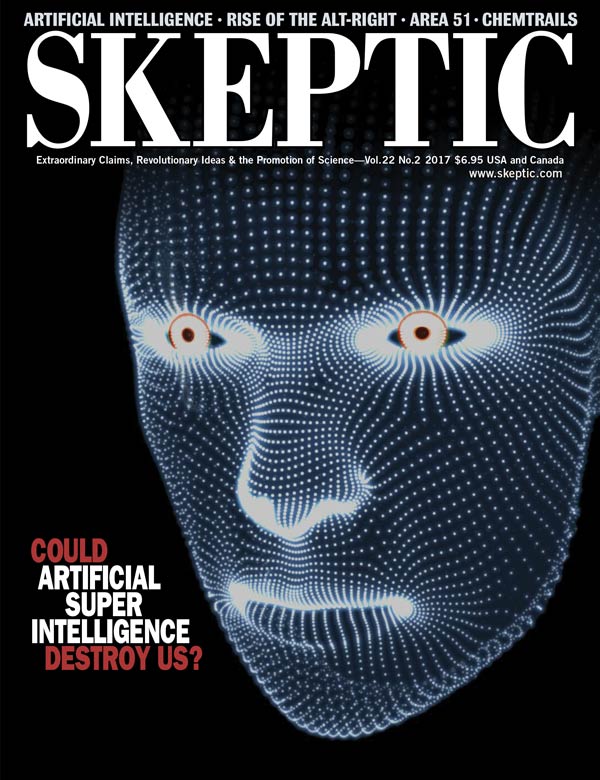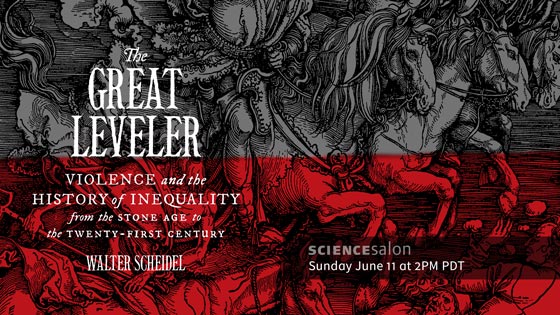In this week’s eSkeptic:
MISSED SCIENCE SALON # 13?
Watch the recording of Dr. Walter Scheidel in conversation with Michael Shermer
For those who could not make it to Pasadena, California for Science Salon #13 with Stanford University historian Dr. Walter Scheidel, we have made a video recording of the event available to you. Watch it online for free.
![The Death of Socrates, by Jacques-Louis David [Public domain], via Wikimedia Commons](https://www.skeptic.com/reading_room/images/Three-Shades-of-Atheism/Jacques-Louis_David_The_Death_of_Socrates.jpg)
In this week’s eSkeptic, based on a sample of hundreds of respondents to a survey distributed through social media, California State University, Fullerton psychologists Brittany Page and Douglas J. Navarick explain the differences they found in how atheists view God.
The Three Shades of Atheism
How Atheists Differ in Their Views on God
by Brittany Page & Douglas J. Navarick
When we think of prominent atheists, we may conjure up an image of one of the “Four Horsemen” of the New Atheism—Christopher Hitchens, Sam Harris, Richard Dawkins, and Daniel Dennett—authors famous for their steadfast rejection of any form of deity and their willingness to confront the world’s religions. Ironically, however, when we see them in debates and interviews, the confidence with which they make their case and discount the opposition may at times seem indistinguishable from the offputting dogmatism of the hyper-religious. How typical of atheists are the Four Horsemen?

This article appeared in Skeptic magazine 22.2 (2017)
Buy this issue
Our research, based on a sample of hundreds of respondents to a survey distributed through social media, indicates that they probably represent a common form of atheism but not the majority view. Most atheists express some degree of tentativeness in their beliefs and would be prepared to consider contrary evidence and arguments. In other words, they are skeptical in their orientation rather than dogmatic. However, the prevalence of dogmatic atheism may come as a surprise to some observers, including Richard Dawkins,1 who stated that he “would be surprised to meet many people” who would say “I know there is no God.” Many respondents in our survey said this.
Distinguishing Between Categories of Atheistic Belief
To categorize the various forms of atheism, it is necessary to distinguish among several closely related concepts.
Formal v. informal meanings of atheism. The term atheism literally means an absence of belief in a deity, as in a theism—without theism. This formal usage broadly encompasses both nonbelief and the explicit rejection of a deity. Nonbelief without any inclination to reject a deity is similar to, but distinguishable from, agnosticism, a term introduced by Thomas Henry Huxley in 1876 at a meeting of Britain’s Metaphysical Society, many of whose members were clergymen, and elaborated upon at a symposium published in 1884 by The Agnostic Annual. Huxley defined agnosticism as the absence of belief one way or the other and the absence of a claim to having any scientific knowledge on the issue:
Agnosticism is of the essence of science, whether ancient or modern. It simply means that a man shall not say he knows or believes that which he has no scientific grounds for professing to know or believe. […]
Minions, Mobs & Myrmidons
MONSTERTALK EPISODE 129
From ancient Greece to modern movies, monsters and villains often get their assistance from mindless mobs of maleficent minions. Are they simply plot devices, or do minions tell us something about the real-world role of the follower when loyal obedience is valued more than heroic ethics? In this episode of Monstertalk, David Perlumtter and Cait Mongrain join us to discuss Minions, Mobs and Myrmidons.

David Perlmutter

Caitlin Mongrain
Get the MonsterTalk Podcast App and enjoy the science show about monsters on your handheld devices! Available for iOS, Android, and Windows. Subscribe to MonsterTalk for free on iTunes.












